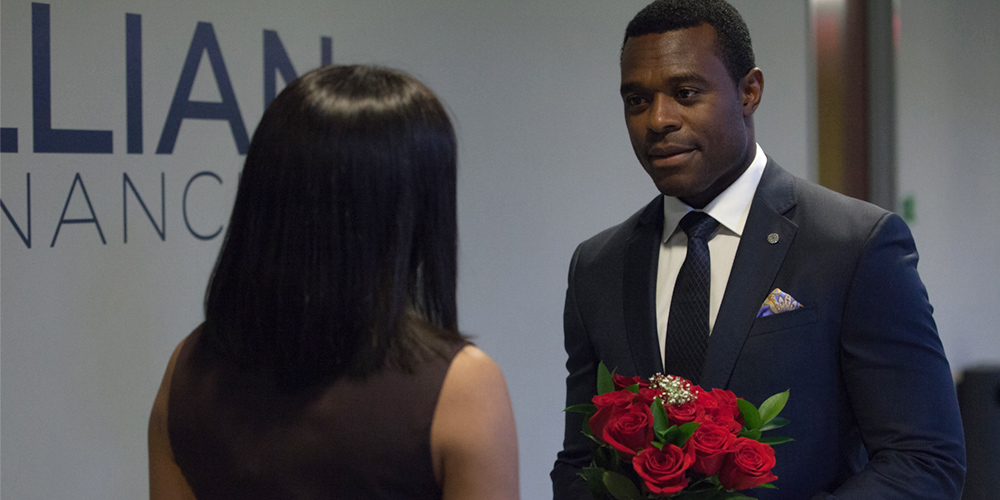Lyriq Bent on Tyler Perry’s ACRIMONY
The Canadian-raised actor discusses his experience starring in the latest film by Tyler Perry.
Tyler Perry is one of the most fascinating filmmakers working today. As one of the most successful figures in Hollywood, Perry has defied the odds and built a media empire. Though he began his career working in comedy, Perry has put out some wild dramas recently. The latest is Acrimony, which finds Perry reuniting with I Can Do Bad All By Myself star Taraji P. Henson. Henson plays Melinda, a troubled woman who is scorned by her husband Robert (Lyriq Bent). The narrative is told from Melinda’s point of view, which initially sets Robert in the role of the villain. Yet, as the film progresses, the line between hero and villain is blurred, and eventually demolished. I’m still dreaming about the day I get to interview Tyler Perry, but in the meantime, we have the second best thing: an interview with one of his stars. Acrimony was Lyriq Bent’s first time working with the auteur, and I was eager to discuss what that experience is like from the inside. Read on for Bent’s thoughts on the film’s troubled hero/villain dynamic, working at Tyler Perry Studios, and what it’s like to make a film with a director who doesn’t do second takes.
Tyler Perry is like a one-man film industry. He has three films coming out this year. So I have to wonder, is there a faster pace on a Tyler Perry set than the other sets you’ve been on?
That’s an understatement. He shoots incredibly quickly. He understands and knows what he wants. He knows how to get it. You’re usually shooting with about six cameras and you have about three different crews, so while you’re shooting you got two other crews setting up at two other sets. As soon as you’re done the scene you’re shooting, you literally walk over or golf cart over to the next set and they’re literally calling ‘action’ as you walk onto the set. So it is very quick, you have to be on point. You gotta come correct. It’s a lot of fun once you leave the idea of what you think filmmaking is all about. If you’ve been spoiled on other films, you gotta leave all that aside and you have to come prepared to work in his world. Once you do that, it is a whirlwind and you don’t even remember moments because you’re going so quickly. You know, we didn’t really have much time to do any kind of second take. Everything was pretty much one take unless we were adamant about something, we might shoot it again. I really can’t put it to words. It’s something you either have to see or experience first hand. There is no formula to the way he works, and if there is it’s really only in his head. As an actor you just have to adapt very very quickly on the spot. You have to be ready to adapt to the environment and really be confident about your abilities. If you’re not, and you’re second-guessing yourself, you will have a meltdown. It’s not for the thin-skinned and it’s not for someone who needs constant reassurance from a director. He will let you know when he’s got the shot and you just have to trust that. If he doesn’t have the shot he will let you know and he’ll talk to you about it and possibly do it again, but he does not want to reshoot anything, so it’s good to be prepared.
Did Taraji prepare you for that experience? She has worked with Tyler before so I’m sure she was used to it.
No. Everything was just go go go. I met Taraji the morning of the first scene, on set. Literally right before he called ‘action’ he said, “Oh Lyriq, this is Taraji. Taraji, Lyriq.” She says, “Oh hey Lyriq, how you doing?” And then I hear, “Rolling!” We were just in the scene. We didn’t talk about the scene, we didn’t talk about the characters, we didn’t talk about the story. All I remember is that we were working. It was that intense. It was my first rodeo and I think I held on for at least six seconds, so I’m qualified.
One of my favourite things in the film is that Melinda always seems to be smoking a cigarette but she never has an ashtray. The ashes are just all over the place. Was that Taraji came up?
I don’t know if she made that conscious decision or if it just happened in a scene and took a life of its own. She never had an ashtray. I don’t know what’s in the film but a couple of times she actually puts the ashes out on me. She actually flicked the cigarette at me. There were some really crazy moments where poor Robert was being abused by cigarette butts. It was just great to see her create that character and watch it unfold as we went on. It was great to see the growth of both characters. Robert was supposed to be a character that does he wrong, in her world, but in his world you just see this poor bastard trying to get things together so that he can create a good life for him and his wife. His intentions were great, he has the best intentions. He was just contending with the insecurities of his wife. That is something that a lot of people deal with in their own personal lives. They’re going to be able to relate to these characters because they’re so real. You’re going about life trying to live it a certain way and someone is conjuring up a different world in their own mind and they put you in that world and then you become this person to them that you’re not. I thought that was really cool the way the story was being narrated. Poor Robert [laughs].
That was actually something I was thinking about a lot during the film. Before we even meet Robert, Melinda’s voiceover says, “This man ruined my life.” So before we even see him there is a negative connotation around the character. He cheats on her and spends her money, but from his perspective, he isn’t being malicious. It makes the viewer think about where they’re going to direct their sympathies, rather than let the film say who’s good and who isn’t. It makes one ask if Robert really is a villain, or if he’s simply a man who is trying and failing. How do you play that as an actor?
The thing is, I think the villain is each individual. We vilify ourselves and sometimes we don’t even know it. We become our worst enemies based on our own thoughts and what we think we know. That’s the situation we have here. As a viewer, we hear from someone’s point of view. What’s the saying…there’s your side, my side, and the truth. Here’s a situation where you’re being told one side. Then we kind of see my side. We find out the truth come the end of the film. During the film you as viewer start thinking like Melinda, and when things unfold you kind of say, “Wow, I was thinking just like her. That’s probably the situation I’m in. That’s probably how my situation is. I’m just assuming that this and that is happening but I really don’t know.” So you find yourself kind of in your own relationships or relationship if you’re in one at the time. I like the film for that reason. The characters really define themselves based on what the viewers think of their own situations. We don’t have to try to talk about the antagonist and the protagonist and all that stuff because I think the audience will do that based on their own connections with the characters.
Tyler Perry is a really interesting filmmaker. He makes many films on a low budget and they do quite well. They’re adored by audiences yet are so unfairly dismissed by critics who refuse to engage with them. I think there’s something to be said about the fact that he’s making films with black actors and is telling stories that aren’t necessarily about race, nor racism. It’s the films about race that are widely lauded yet Tyler is telling stories about people.
He’s telling what he’s experienced, he’s telling what he knows. Do some of them fall into the stereotypical genre, yes they do. But there are truths to stereotypes. It’s about how far you stretch that truth or how much do you play up that truth of that stereotype. A stereotype is only a negative thing if you say that that’s all it is. No, that’s not all it is. There’s more to the stereotypes if you just dig a little deeper and understand whatever that stereotype is. Tyler is just talking about what he knows. Just because you’re black doesn’t mean that you’ve experienced everything another black person has experienced or experienced it the same way. Same goes for if you’re white or any other race. We all have different experiences. If you have a different experience than another person and you have the opportunity to tell that story, then great. That’s what we’re trying to do. We’re trying to create opportunities for people to tell their different stories. Yeah, he’s taken a beating for the last ten years and I’m guilty of that too. There was a lot of his stuff that I wasn’t really about because I thought it was stereotypical and I’d seen Hollywood do it. But some of the stuff he did was good. He’s taken a beating but he’s stood his ground and he kept telling the stories that he knew and it has resonated with a lot of people. Here we are taking a chance at something totally different than what he’s used to doing and what people know him for. I think he did a great job with it.
What do you think it is about his films that regardless of what any critic is going to write in a newspaper, keeps the audiences coming back?
He struck a chord with a lot of people in terms of experiences. That’s what people want. At the end of the day people are being entertained and informed by his movies and I think the audience has come to trust him over the years. They know what they’re going to get and they get exactly that. Until he decides not to tell these stories, people are going to come out and watch what he does because they have a certain trust for him. That took a lot of time and a lot of hard work to develop that. He should protect that. The industry is always going to have something to say but the average person is not that critical about the making of a film and how it’s made or promoted. They just want to know that it’s there when they want to see it and that’s what he’s been doing.
Tyler Perry’s Acrimony hits theatres nationwide on Friday, March 28. For more Lyriq Bent, check out his Instagram page @lyriqbent.





